Understanding Oxycodone 30mg its uses, Side Effects, and Precautions
Oxycodone 30mg is a prescription medication used to manage moderate to severe pain. It is often prescribed after surgeries, injuries, or for chronic pain conditions. While it can be an effective pain management tool, it can also lead to addiction and abuse, making it important to understand its uses, side effects, and precautions before taking it.
1. Introduction to Oxycodone 30mg
Oxycodone 30mg is a potent opioid pain medication that is commonly prescribed to manage moderate to severe pain. It belongs to the class of drugs known as narcotic analgesics and works by binding to opioid receptors in the brain and spinal cord, effectively blocking pain signals.
This medication is typically prescribed for short-term use, such as after surgery or injury, or for chronic pain conditions that require around-the-clock management. Oxycodone 30mg is available in various formulations, including immediate-release tablets and extended-release capsules.
The primary use of Oxycodone 30mg is to provide relief from intense pain that cannot be effectively managed with over-the-counter pain relievers. It is often used for post-operative pain, cancer-related pain, or pain associated with conditions like arthritis or fibromyalgia.
However, it is essential to note that Oxycodone 30mg is a controlled substance due to its high potential for abuse and addiction. Therefore, it should only be taken under the strict supervision of a healthcare professional and in the prescribed dosage.
Like any medication, Oxycodone 30mg may have side effects. Common side effects can include drowsiness, constipation, nausea, and dizziness. Serious side effects, such as difficulty breathing or a slow heart rate, should be immediately reported to a healthcare provider.
It is crucial to follow all precautions and guidelines provided by your healthcare professional when taking Oxycodone 30mg. This includes disclosing your medical history, current medications, and any allergies to ensure its safe and effective use.
In conclusion, Oxycodone 30mg is a powerful pain medication that should be used cautiously and responsibly. Understanding its uses, potential side effects, and taking necessary precautions is essential for both the patient and their healthcare provider. Always consult with a medical professional for personalized advice and guidance regarding the use of Oxycodone 30mg.
2. What is Oxycodone and how does it work?
Oxycodone is a powerful opioid medication that is commonly prescribed for the management of moderate to severe pain. It belongs to a class of drugs known as narcotic analgesics, which work by binding to opioid receptors in the brain and spinal cord, thereby reducing the sensation of pain.
As one of the most widely used prescription painkillers, Oxycodone is available in various forms, including immediate-release tablets, extended-release tablets, and oral solutions. The 30mg dosage is typically prescribed for those who require a higher strength formulation to effectively alleviate their pain.
When taken orally, Oxycodone is rapidly absorbed into the bloodstream, reaching its peak concentration within one to two hours. The immediate-release form provides quick pain relief, while the extended-release formulation offers a prolonged duration of action, providing around-the-clock pain management.
It’s important to note that Oxycodone is a controlled substance due to its potential for abuse and addiction. It acts on the central nervous system, producing not only pain relief but also a sense of euphoria and relaxation. This can lead to misuse and dependence if not taken as directed by a healthcare professional.
It’s crucial to follow the prescribed dosage and duration of treatment to minimize the risk of adverse effects. Additionally, abrupt discontinuation of Oxycodone can lead to withdrawal symptoms, so it’s essential to gradually reduce the dosage under medical supervision when stopping the medication.
While Oxycodone can effectively alleviate pain, it is not without its potential side effects. Common side effects may include constipation, drowsiness, nausea, vomiting, and dizziness. It’s advisable to inform your healthcare provider if these side effects persist or worsen over time.
Furthermore, it’s important to exercise caution when combining Oxycodone with other substances that depress the central nervous system, such as alcohol or certain sedatives. This combination can increase the risk of respiratory depression and other serious complications.
In conclusion, Oxycodone is a potent opioid medication used for the management of moderate to severe pain. Understanding its mechanism of action, proper usage, and potential side effects is crucial to ensure safe and effective treatment. Always consult with a healthcare professional for personalized advice and guidance regarding the use of Oxycodone.
3. Common medical uses of Oxycodone 30mg
Oxycodone 30mg, a powerful opioid medication, is commonly prescribed by healthcare professionals for various medical conditions. This specific dosage of Oxycodone is often used to manage moderate to severe pain that cannot be effectively controlled by other pain relievers or non-pharmacological interventions.
One of the primary medical uses of Oxycodone 30mg is in the treatment of chronic pain conditions, such as cancer-related pain and severe back pain. In these cases, the medication helps to alleviate the intensity of the pain, allowing patients to experience a better quality of life.
Additionally, Oxycodone 30mg may be prescribed following surgical procedures, such as major orthopedic surgeries or abdominal surgeries. It helps to manage post-operative pain, enabling patients to recover comfortably and facilitating their healing process.
Moreover, individuals who suffer from breakthrough pain, which refers to sudden episodes of intense pain that occur despite ongoing pain management, may benefit from Oxycodone 30mg. This medication can provide rapid relief during these episodes, allowing patients to regain control and function in their daily lives.
It’s worth noting that Oxycodone 30mg should only be used under the guidance and supervision of a healthcare professional. The dosage and duration of treatment may vary depending on the individual’s specific condition, medical history, and response to the medication.
While Oxycodone 30mg can be highly effective in managing pain, it is crucial to understand and be aware of the potential side effects and precautions associated with its use. This will help ensure safe and responsible usage, minimizing the risk of adverse effects and promoting optimal therapeutic outcomes.
4. Potential side effects of Oxycodone 30mg
As with any medication, it’s important to be aware of the potential side effects that may occur when taking Oxycodone 30mg. While this medication can be highly effective in managing pain, it’s crucial to understand and monitor any adverse reactions that may arise.
One of the most common side effects of Oxycodone 30mg is drowsiness. This medication can cause a sedative effect, making it important to avoid operating heavy machinery or engaging in activities that require alertness until you know how your body responds to the drug. It’s essential to follow the prescribed dosage and not exceed it, as higher doses can intensify the sedative effects.
Another potential side effect of Oxycodone 30mg is constipation. Opioid medications like Oxycodone can slow down the digestive system, leading to difficulty in passing stools. To alleviate this, it’s recommended to increase fluid intake, eat a fiber-rich diet, and engage in regular physical activity. If constipation persists or becomes severe, it’s important to consult your healthcare provider for further guidance.
In some cases, individuals may experience nausea or vomiting while taking Oxycodone 30mg. This can be managed by taking the medication with food or discussing anti-nausea medications with your doctor.
It’s crucial to be aware of the potential for respiratory depression, especially when taking high doses of Oxycodone. This can manifest as slowed or shallow breathing, which requires immediate medical attention. Inform your healthcare provider immediately if you experience any difficulty breathing while taking this medication.
Other side effects that may occur but are less common include dizziness, headache, dry mouth, itching, and sweating. While these side effects are usually mild and transient, it’s important to report any unusual or severe reactions to your healthcare provider.
In conclusion, understanding the potential side effects of Oxycodone 30mg is vital for safe and effective use. By being informed and monitoring your body’s response to the medication, you can work closely with your healthcare provider to manage any side effects that may arise and ensure the best possible outcome in pain management.
5. Precautions and considerations before taking Oxycodone 30mg
Before taking Oxycodone 30mg, it is crucial to be aware of certain precautions and considerations to ensure your safety and well-being. While this medication can be highly effective in managing pain, it is essential to use it responsibly and under the guidance of a healthcare professional.
First and foremost, it is important to disclose any existing medical conditions or allergies to your doctor before taking Oxycodone 30mg. Certain conditions, such as respiratory problems, liver or kidney disease, or a history of substance abuse, may affect how your body reacts to the medication. Your doctor will be able to assess the potential risks and benefits based on your individual health profile.
Additionally, it is vital to inform your doctor about any medications you are currently taking, including prescription drugs, over-the-counter medications, and supplements. Some medications, such as certain antidepressants or sedatives, can interact with Oxycodone 30mg and cause adverse effects. Your doctor can help you understand if any potential drug interactions may occur and adjust your treatment plan accordingly.
Furthermore, it is crucial to follow the prescribed dosage and frequency as directed by your healthcare provider. Taking higher doses or using Oxycodone 30mg more frequently than prescribed can increase the risk of side effects, dependency, and addiction. It is essential to communicate openly with your doctor about your pain levels and any concerns you may have to ensure the medication is effectively managing your pain without compromising your overall health.
If you experience any severe side effects, such as difficulty breathing, severe drowsiness, or allergic reactions like rash or swelling, seek immediate medical attention. These symptoms may indicate a serious reaction to the medication that requires prompt intervention.
Finally, it is important to note that Oxycodone 30mg is a potent opioid medication with the potential for misuse and addiction. It is crucial to use this medication only as prescribed and to store it securely to prevent unauthorized access. If you have a history of substance abuse or addiction, discuss alternative pain management options with your healthcare provider.
By understanding and following these precautions and considerations, you can ensure the safe and responsible use of Oxycodone 30mg, maximizing its benefits while minimizing potential risks. Always consult with your doctor for personalized medical advice and guidance regarding this medication.
6. Drug interactions with Oxycodone 30mg
When taking any medication, it is essential to be aware of potential drug interactions to ensure your safety and prevent any adverse effects. Oxycodone 30mg is a powerful opioid pain reliever commonly prescribed for moderate to severe pain management. Understanding its potential interactions with other drugs is crucial for avoiding potentially harmful situations.
Firstly, it is important to note that combining oxycodone with other central nervous system depressants, such as alcohol, benzodiazepines, or sedatives, can result in increased sedation, respiratory depression, and even overdose. It is strongly advised to avoid the concurrent use of these substances to prevent potentially life-threatening consequences.
Certain medications, such as Monoamine Oxidase Inhibitors (MAOIs) and selective serotonin reuptake inhibitors (SSRIs), used for the treatment of depression and anxiety, should not be taken in combination with oxycodone. This combination can lead to a potentially dangerous condition called serotonin syndrome, characterized by symptoms such as agitation, confusion, rapid heartbeat, high blood pressure, and even seizures.
Antidepressants, antifungal medications, and antibiotics can also interact with oxycodone, affecting its metabolism and potentially increasing its concentration in the body. This can lead to an increased risk of side effects and toxicity. It is crucial to inform your healthcare provider about all medications, including over-the-counter drugs and herbal supplements, you are currently taking to avoid any potential interactions.
Furthermore, it is important to note that drug interactions are not limited to prescription medications. Some herbal supplements, such as St. John’s Wort and kava, can interact with oxycodone, either by decreasing its effectiveness or enhancing its sedative effects. It is always recommended to consult with a healthcare professional before combining any herbal remedies with oxycodone.
In conclusion, understanding the potential drug interactions with oxycodone 30mg is essential for safe and effective pain management. Always disclose your complete medication list, including any herbal supplements, to your healthcare provider, and follow their guidance to minimize the risk of adverse reactions. Remember, your health and well-being should always be the top priority when taking any medication.
7. How to take Oxycodone 30mg safely and responsibly
Taking Oxycodone 30mg safely and responsibly is crucial to minimize the risk of adverse effects and ensure its effectiveness. Here are some guidelines to follow:
1. Follow the prescribed dosage: Never exceed the recommended dose provided by your healthcare professional. Oxycodone 30mg is a potent opioid medication, and taking more than prescribed can lead to serious health consequences, including overdose.
2. Take it as directed: Oxycodone 30mg is typically taken orally, with or without food. Follow the instructions provided by your doctor or pharmacist regarding the timing and frequency of doses. Do not crush, chew, or break the tablets unless specifically instructed to do so.
3. Avoid alcohol and other sedatives: Mixing oxycodone with alcohol or other central nervous system depressants can intensify its sedative effects and increase the risk of respiratory depression. It is important to avoid these substances while taking this medication.
4. Be aware of potential interactions: Inform your doctor about all the medications you are currently taking, including over-the-counter drugs and herbal supplements. Some medications, such as certain antidepressants, antifungal agents, or benzodiazepines, can interact with oxycodone and cause adverse effects or reduce its effectiveness.
5. Monitor for side effects: While taking oxycodone 30mg, it is important to be vigilant for any potential side effects. Common side effects may include constipation, drowsiness, nausea, or dizziness. If any severe or persistent side effects occur, such as difficulty breathing, chest pain, or confusion, seek medical attention immediately.
6. Store securely and keep out of reach: Oxycodone is a controlled substance and should be stored securely in a locked cabinet or container, out of reach of children, pets, and others for whom it is not prescribed. Proper disposal of unused medication is also essential to prevent misuse or accidental ingestion.
Remember, always consult your healthcare provider for personalized advice on taking oxycodone 30mg safely, as individual factors and medical history can influence the appropriate usage of this medication.
8. Signs of Oxycodone 30mg misuse or addiction
It is crucial to be aware of the signs of Oxycodone 30mg misuse or addiction, as early detection can greatly help in preventing further harm and facilitating timely intervention. While this medication can provide effective pain relief when used as prescribed, it carries a risk of misuse and addiction, especially when misused for recreational purposes.
One of the key signs to watch out for is an increasing tolerance to the medication. This means that the individual may require higher doses to achieve the same level of pain relief or euphoria. Frequent requests for prescription refills or doctor shopping to obtain multiple prescriptions may also indicate potential misuse.
Physical and behavioral changes can also indicate misuse or addiction. These may include drowsiness, dizziness, confusion, or impaired coordination. Individuals may exhibit mood swings, irritability, or become socially withdrawn. Neglect of personal responsibilities, such as work or family obligations, can also be a red flag.
Other signs may include frequent requests for early refills, reluctance to disclose the use of Oxycodone, or excessive focus on obtaining and using the medication. Financial difficulties or engaging in illegal activities to support the habit are serious warning signs and should not be ignored.
It is important to note that these signs are not definitive proof of misuse or addiction, but they should serve as a cause for concern and prompt further investigation. If you suspect that you or someone you know is misusing or addicted to Oxycodone 30mg, it is crucial to seek professional help and support.
Remember, early intervention is key in addressing substance misuse or addiction. Reach out to healthcare professionals, addiction specialists, or helplines dedicated to substance abuse for guidance and assistance. Understanding and recognizing the signs of misuse or addiction can make a significant difference in helping individuals regain control of their health and well-being.
9. Frequently asked questions about Oxycodone 30mg
As with any medication, it is common for individuals to have questions and concerns about Oxycodone 30mg. Here are some frequently asked questions about this medication along with their answers:
1. What is Oxycodone 30mg used for?
Oxycodone 30mg is a powerful opioid pain medication. It is typically prescribed to relieve severe pain that cannot be managed with other pain medications. It works by binding to opioid receptors in the brain, blocking pain signals and providing relief.
2. Are there any side effects of Oxycodone 30mg?
Like other opioids, Oxycodone 30mg can cause various side effects. Common side effects include drowsiness, constipation, nausea, vomiting, dizziness, and dry mouth. It is important to note that not everyone will experience these side effects, and they may vary in severity.
3. Can I become addicted to Oxycodone 30mg?
Oxycodone is a highly addictive substance, and prolonged use can lead to physical and psychological dependence. It is crucial to take this medication exactly as prescribed by your healthcare provider and to follow their instructions carefully. If you have a history of substance abuse, it is important to discuss this with your doctor before taking Oxycodone 30mg.
4. What precautions should I take while using Oxycodone 30mg?
There are several precautions to keep in mind when taking Oxycodone 30mg. It is important not to exceed the prescribed dosage and to avoid alcohol while on this medication, as it can increase the risk of side effects. Additionally, inform your healthcare provider about any other medications you are taking, as certain drugs can interact with Oxycodone and cause adverse effects.
5. Can I stop taking Oxycodone 30mg suddenly?
Abruptly stopping Oxycodone 30mg can lead to withdrawal symptoms, especially if you have been taking it for an extended period. It is crucial to follow your healthcare provider’s instructions regarding the gradual reduction of the dosage when discontinuing this medication.
Remember, it is essential to consult with your healthcare provider or pharmacist if you have any specific questions or concerns about Oxycodone 30mg. They will be able to provide you with personalized advice and guidance based on your individual medical history and needs.
10. Conclusion and final thoughts on Oxycodone 30mg
In conclusion, Oxycodone 30mg is a potent opioid medication that is primarily used for managing severe pain. It works by binding to opioid receptors in the brain and spinal cord, effectively blocking pain signals. While it can provide significant pain relief, it is crucial to use Oxycodone 30mg with caution due to its potential for abuse and addiction.
Before considering the use of Oxycodone 30mg, it is essential to consult with a healthcare professional who can evaluate your specific condition and assess whether this medication is suitable for you. They will also provide guidance on the appropriate dosage and duration of treatment.
As with any medication, Oxycodone 30mg may cause side effects. These can range from mild to severe and may include drowsiness, constipation, nausea, and respiratory depression. It is crucial to be aware of these potential side effects and report any concerning symptoms to your healthcare provider promptly.
Moreover, it is essential to take precautions when using Oxycodone 30mg. This includes avoiding alcohol and certain medications that can interact with it, following the prescribed dosage, and not exceeding the recommended duration of treatment. It is also vital to store Oxycodone 30mg securely and out of reach of children or individuals who may misuse it.
Overall, Oxycodone 30mg can be an effective option for managing severe pain when used responsibly under medical supervision. However, it should be approached with caution and only used as prescribed. If you have any concerns or questions about this medication, it is always best to consult with your healthcare provider for personalized advice and guidance.
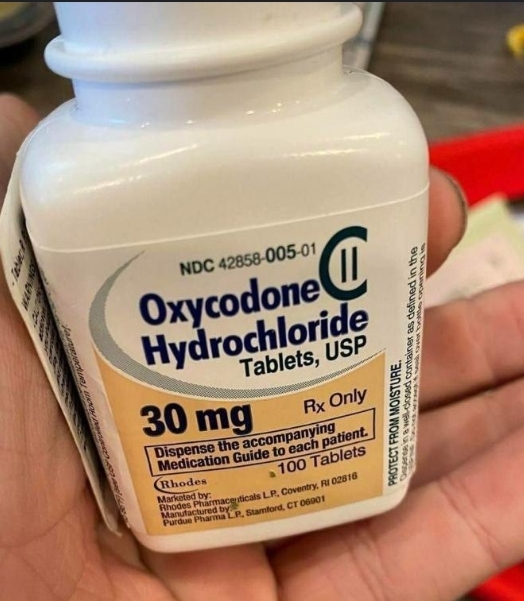
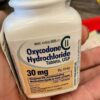

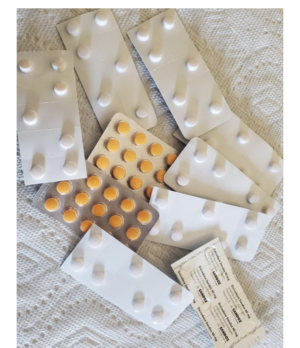
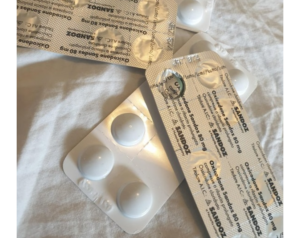
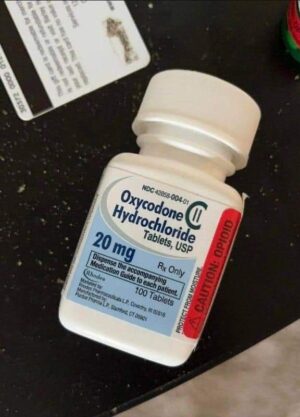

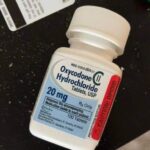


Reviews
There are no reviews yet.